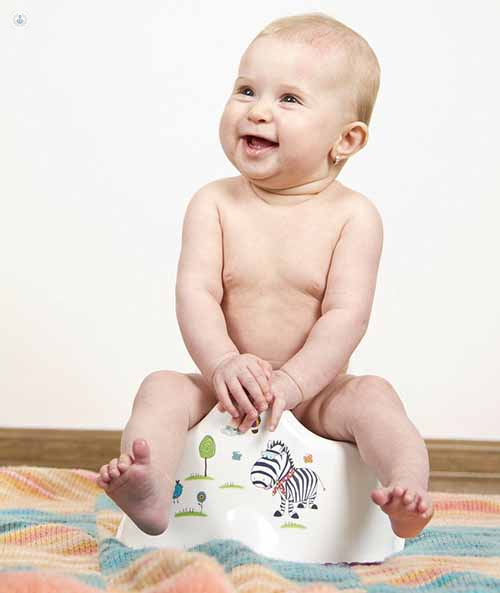How to prevent UTIs in kids
Autore:Urinary tract infection (UTI) is a very common illness in children and one that parents need to be aware of. If a UTI is not diagnosed and treated, it can sometimes affect the kidneys. Dr Kishor Tewary, a leading paediatrician, explains to us what the key symptoms of a UTI are in children and infants, and how they can best be prevented.

Are UTIs common in children?
Urinary tract infections are one of the commonest causes of fever in childhood, and around 11% of girls and 4% of boys will suffer from a UTI in their childhood. Furthermore, 2.1% of girls and 2.2% of boys will have had a UTI before the age of 2 years.
UTIs are more common in girls (after infancy) due to the shorter urethra and the anatomical proximity of genital orifices. As most of the bacteria and germs are coming from the gastrointestinal tract, it is easy to migrate to the urinary tract with just the slightest lapse in maintaining personal hygiene.
In infancy, UTIs can be more common in boys due to their inherent preponderance for urogenital abnormalities.
What are the typical symptoms of childhood UTIs?
Typically, children with a UTI can present with the following symptoms:
- A general feeling of being unwell and not feeling like their normal self.
- Fever
- Pain when passing urine (dysuria)
- Loin pain
- Feeling sick/nauseated
The symptoms may vary and often younger children cannot verbalise their symptoms. The symptoms in babies can often be non-specific, such as presenting with vomiting, being unwell, diarrhoea and/or loss of weight or even prolonged new-born jaundice.
Occasionally, children can present with frank haematuria (visible blood in the urine) or secondary urinary incontinence (incontinence after achieving a dry period of over six months).
If the infection is confined to the lower section of the urinary tract (i.e. the bladder), children can only present with dysuria . However, dysuria alone in a healthy child without fever can be due to local vulvar inflammation/irritation, and this needs to be ruled out.
Is there any way I can prevent a UTI in my child?
The best way to prevent a UTI is to take care of the trigger factors, which include liquid intake, bladder and bowel habits, prevention of constipation and hygiene.
- Liquid intake:
It is always advisable to drink between 6-8 glasses of plain liquid at least every day. A good liquid intake replenishes the circulation and flushes the kidneys and bladder to prevent the collection of waste and toxic products/germs.
- Bladder habit:
A regular bladder habit (i.e. voiding, or urinating, every 2-4 hours) is recommended to prevent the growth of unfriendly germs. Young children often have a tendency to hold their urine, especially at school. This not only affects bladder tonicity, but it also promotes the growth of unhealthy germs in the bladder and in the stagnant urine held in the bladder and hence results in infection. UTI is an ascending infection and can often migrate upwards to the upper tract (i.e. the kidneys).
- Bowel habit:
A constipated bowel can affect the emptying of the bladder and also irritate the bladder musculature. This causes incomplete emptying and residual urine in the bladder and also irritability of the bladder muscles. Residual urine can promote the growth of unfriendly germs and lead to infection.
It is recommended to have a regular bowel habit, opening the bowels every day if possible, and the stool consistency should be soft. A regular liquid intake, a good intake of fruits and fibre, and regular exercise or physical activity helps to keep the bowel movements regulated. Sometimes a laxative may be needed, but only if a doctor advises it.
- Hygiene:
Regular cleaning of the genital area is very important to keep the area germ-free. The urinary passage is quite close to the anal area in girls and improper cleaning can promote the growth of germs in the gut to migrate to the bladder and cause urinary infection. Front to back wiping and daily showers or a bath will help in keeping the area clean.
- Non-pharmacological agents:
There is variable evidence of how successful these are in preventing UTIs. However, the consumption of live yoghurt or lactobacillus/probiotic drinks may help in the prevention of infection by promoting the growth of friendly bacteria in the gut and colon. There are other agents tried, such as cranberry juice, and again the response is very variable.
It is important to seek a doctor’s advice whenever a child seems to be unwell with no obvious source of infection, such as a cold, a cough etc. A delay in diagnosis and management may sometimes affect the kidneys and hence prompt action is required if a UTI is suspected.
If you are concerned about your child’s health and would like to see a paediatrician, you can request an appointment with Dr Kishor Tewary.


